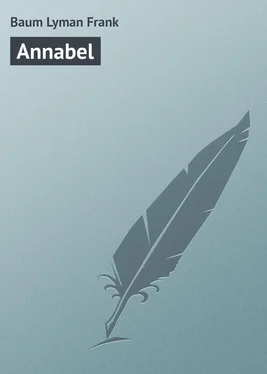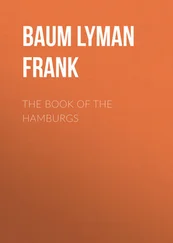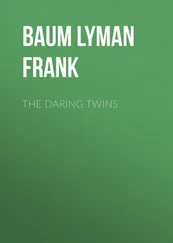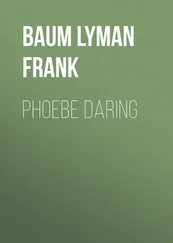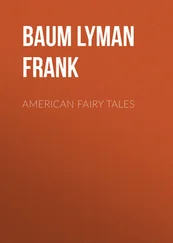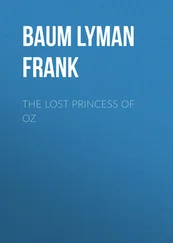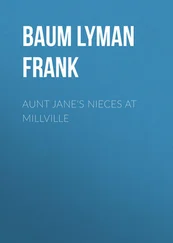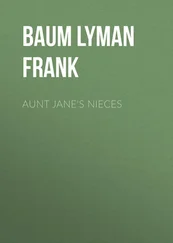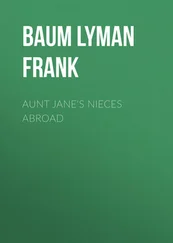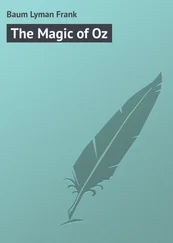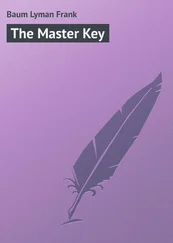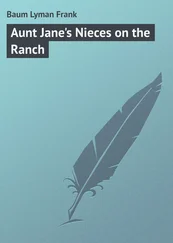Lyman Baum - Annabel
Здесь есть возможность читать онлайн «Lyman Baum - Annabel» — ознакомительный отрывок электронной книги совершенно бесплатно, а после прочтения отрывка купить полную версию. В некоторых случаях можно слушать аудио, скачать через торрент в формате fb2 и присутствует краткое содержание. Жанр: foreign_language, foreign_prose, на английском языке. Описание произведения, (предисловие) а так же отзывы посетителей доступны на портале библиотеки ЛибКат.
- Название:Annabel
- Автор:
- Жанр:
- Год:неизвестен
- ISBN:нет данных
- Рейтинг книги:3 / 5. Голосов: 1
-
Избранное:Добавить в избранное
- Отзывы:
-
Ваша оценка:
- 60
- 1
- 2
- 3
- 4
- 5
Annabel: краткое содержание, описание и аннотация
Предлагаем к чтению аннотацию, описание, краткое содержание или предисловие (зависит от того, что написал сам автор книги «Annabel»). Если вы не нашли необходимую информацию о книге — напишите в комментариях, мы постараемся отыскать её.
Annabel — читать онлайн ознакомительный отрывок
Ниже представлен текст книги, разбитый по страницам. Система сохранения места последней прочитанной страницы, позволяет с удобством читать онлайн бесплатно книгу «Annabel», без необходимости каждый раз заново искать на чём Вы остановились. Поставьте закладку, и сможете в любой момент перейти на страницу, на которой закончили чтение.
Интервал:
Закладка:
Suzanne Metcalf
Annabel / A Novel for Young Folks
CHAPTER I
WILL MEETS WITH A REBUKE
“Here are your vegetables, Nora,” said Will Carden, as he scraped his feet upon the mat before the kitchen door of the “big house.”
“Come in, Masther Willyum,” called the cook, in her cheery voice.
So the boy obeyed the summons and pushed open the screen door, setting his basket upon the white table at Nora’s side.
“Oo, misery! but them pays is illegant,” she said, breaking open a green pod and eating the fresh, delicious contents. “Why, Masther Willyum, the bloom is on ’em yet.”
“I picked them myself, Nora,” the boy answered, with a pleased laugh, “and only a little while ago, at that. And you’ll find the tomatoes and the celery just as nice, I’m sure.”
“They can’t be bate,” responded the cook, emptying the basket and handing it to him. “Sure, I don’t know whatever we’d do widout yez to bring us the grans stuff, Masther Willyum.”
“I wish,” said he, hesitatingly, “you wouldn’t call me ‘master,’ Nora. Call me Will, as everyone else does. I’m not old enough to have a handle to my name, and I’m not much account in the world, – yet.”
Nora’s round, good natured face turned grave, and she looked at the boy with a thoughtful air.
“I used to know the Cardens,” she said, “when they didn’t have to raise vegetables to earn a living.”
Will flushed, and his eyes fell.
“Never mind that, Nora,” he answered, gently. “We’ve got to judge people by what they are, not by what they have been. Good bye!” and he caught up his basket and hastily retreated, taking care, however, to close the screen door properly behind him, for he knew the cook’s horror of flies.
“Poor boy!” sighed Nora, as she resumed her work. “It ain’t his fault, at all at all, that the Cardens has come down in the wurruld. But down they is purty close to the bottom, an’ it ain’t loikly as they’ll pick up ag’in in a hurry.”
Meantime the vegetable boy, whistling softly to himself, passed along the walk that led from the back of the big house past the stables and so on to the gate opening into the lane. The grounds of the Williams mansion were spacious and well kept, the lawns being like velvet and the flower beds filled with artistic clusters of rare blooming plants. A broad macadamed driveway, edged with curbs of dressed stone, curved gracefully from the carriage porch to the stables, crossing the lawn like a huge scroll.
At one side of this a group of children played upon the grass – two boys and three girls – while the nurse who was supposed to have charge of the smallest girl, as yet scarcely more than a baby, sat upon a comfortable bench engaged in reading a book.
As Will passed, one of the little girls lay flat upon the ground, sobbing most dismally, her golden head resting upon her outstretched arms. The boy hesitated an instant, and then put down his basket and crossed the lawn to where the child lay, all neglected by her companions.
“What’s wrong, Gladie?” he asked, sitting on the grass beside her.
“Oh, Will,” she answered, turning to him a tear-stained face, “m – my d – d – dolly’s all bwoke, an’ Ted says she’ll h – h – have t’ go to a h – h – hospital, an’ Ma’Weeze an’ Wedgy says they’ll m – m – make a f – fun’ral an’ put dolly in the c – cold gwound, an’ make her dead!” and the full horror of the recital flooding her sensitive little heart, Gladys burst into a new flood of tears.
Will laughed.
“Don’t you worry about it, Gladie,” he said, in a comforting tone. “We’ll fix dolly all right, in less than a jiffy. Where is she, and where’s she broke?”
Hope crept into the little face, begot of a rare confidence in the big boy beside her. Gladys rolled over upon the grass, uncovering a French doll of the jointed variety, dressed in very elaborate but soiled and bedraggled clothes and having a grimy face and a mass of tangled hair. It must have been a pretty toy when new, but the doll had never won Gladys’ whole heart so long as it remained immaculate and respectable. In its present disreputable condition it had become her dearest treasure, and when she handed the toy to Will Carden and showed him where one leg was missing from the knee down, a fresh outburst of grief convulsed her.
“Her l – leg is all b – bwoke!” she cried.
“That’s bad,” said Will, examining the doll carefully. “But we’ll play I’m the doctor, come to make her well. Where’s the other piece, Gladie?”
The child hastily searched for her pocket, from which, when at last the opening was found, she drew forth the severed leg. By this time the other children had discovered Will’s presence and with a wild whoop of greeting they raced to his side and squatted around him on the lawn, curiously watching to see how he would mend the doll. Theodore was about Will’s own age, but much shorter and inclined to stoutness. His face habitually wore a serious expression and he was very quiet and stolid of demeanor. Reginald, the other boy, was only nine, but his nature was so reckless and mischievous that he was the life of the whole family and his mother could always tell where the children were playing by listening for the sound of Reginald’s shrill and merry voice.
Mary Louise was fourteen – a dark haired, blue eyed maiden whose sweet face caused strangers to look more than once as she passed them by. To be sure she was very slender – so slight of frame that Reginald had named her “Skinny” as a mark of his brotherly affection; but the girl was so dainty in her ways and so graceful in every movement that it was a wonder even her careless younger brother should not have recognized the fact that her “skinny” form was a promise of great beauty in the years to come.
Then there was Annabel, the “odd one” of the Williams family, with a round, freckled face, a pug nose, tawny red hair and a wide mouth that was always smiling. Annabel was twelve, the favored comrade of her brothers and sisters, the despair of her lady mother because of her ugliness of feature, and the pet of Nora, the cook, because she was what that shrewd domestic considered “the right stuff.” Annabel, in spite of her bright and joyous nature, was shy with strangers, and at times appeared almost as reserved as her brother Theodore, which often led to her being misunderstood. But Will Carden was no stranger to the Williams children, being indeed a school-mate, and as they flocked around him this bright Saturday morning they showered questions and greetings upon their friend in a somewhat bewildering manner.
The boy had only one thought in mind, just then: to comfort little Gladys by making her dolly “as good as new.” So whistling softly, in his accustomed fashion, he drew out his pocket knife and began fishing in the hole of the doll’s leg for the elastic cord that had parted and allowed her lower joint to fall off. Gladys watched this operation with wide, staring eyes; the others with more moderate interest; and presently Will caught the end of the cord, drew it out, and made a big knot in the end so it could not snap back again and disappear. Then, in the severed portion, he found the other end of the broken elastic, and when these two ends had been firmly knotted together the joints of the leg snapped firmly into place and the successful operation was completed.
“Hooray!” yelled Reginald, “it’s all right now, Gladie. We’ll postpone the funeral till another smash-up.”
The little one’s face was wreathed with smiles. She hugged the restored doll fondly to her bosom and wiped away the last tears that lingered on her cheeks. The callous nurse looked over at the group, yawned, and resumed her reading.
Читать дальшеИнтервал:
Закладка:
Похожие книги на «Annabel»
Представляем Вашему вниманию похожие книги на «Annabel» списком для выбора. Мы отобрали схожую по названию и смыслу литературу в надежде предоставить читателям больше вариантов отыскать новые, интересные, ещё непрочитанные произведения.
Обсуждение, отзывы о книге «Annabel» и просто собственные мнения читателей. Оставьте ваши комментарии, напишите, что Вы думаете о произведении, его смысле или главных героях. Укажите что конкретно понравилось, а что нет, и почему Вы так считаете.
